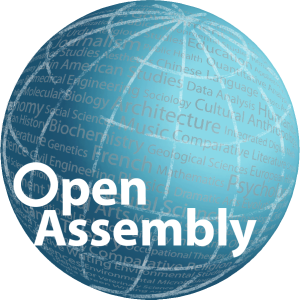Recently, in the context of an experimental MOOC she was teaching at Duke, Cathy Davidson asked the question: “Why have we so quickly adapted to a new mode of collaborative, cross-disciplinary, instrumental, just-in-time, non-expert knowledge-making everywhere except in school?”
Her argument:
“Whereas everyday, everywhere learning has become a hallmark of our social life and work life in the post-Internet era, education–K through 22–remains largely wedded to the disciplinary silos, formal knowledge taxonomies, summative assessment measures, and formal credentialing apparatus designed for the research university of the late Industrial Age. The Internet went public on April 22, 1993. We’re still teaching like its 1992.”
Open Assembly was founded with the goal of seeking a solution to the problem Cathy Davidson’s question highlights, with a software framework for collaborative teaching and learning designed to let us engage with each other and with content inside the classroom–much the way we do everyday, in every other context. Open educational resources (OER) inherently facilitate sharing and collaboration, and the Open Assembly platform is specifically designed to leverage that capability.
